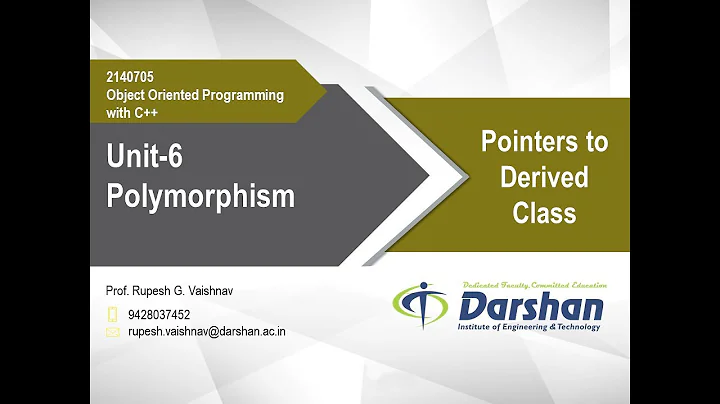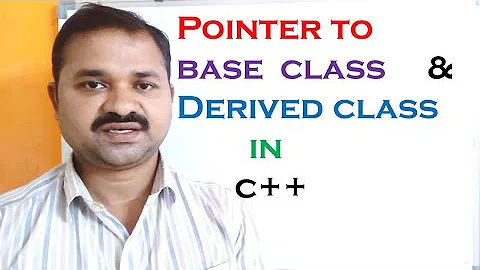C++ Access derived class member from base class pointer
Solution 1
No, you cannot access derived_int because derived_int is part of Derived, while basepointer is a pointer to Base.
You can do it the other way round though:
Derived* derivedpointer = new Derived;
derivedpointer->base_int; // You can access this just fine
Derived classes inherit the members of the base class, not the other way around.
However, if your basepointer was pointing to an instance of Derived then you could access it through a cast:
Base* basepointer = new Derived;
static_cast<Derived*>(basepointer)->derived_int; // Can now access, because we have a derived pointer
Note that you'll need to change your inheritance to public first:
class Derived : public Base
Solution 2
You're dancing on a minefield here. The base class can never know that it's actually an instance of the derived. The safest way to do that would be to introduce a virtual function in the base:
class Base
{
protected:
virtual int &GetInt()
{
//Die horribly
}
public:
int base_int;
};
class Derived : Base
{
int &GetInt()
{
return derived_int;
}
public:
int derived_int
};
basepointer->GetInt() = 0;
If basepointer points as something other that a Derived, your program will die horribly, which is the intended result.
Alternatively, you can use dynamic_cast<Derived>(basepointer). But you need at least one virtual function in the Base for that, and be prepared to encounter a zero.
The static_cast<>, like some suggest, is a sure way to shoot yourself in the foot. Don't contribute to the vast cache of "unsafety of the C language family" horror stories.
Solution 3
you can use CRTP
you basically use the derived class in the template for the base class
Solution 4
It is possible by letting the base class know the type of derived class. This can be done by making the base class a template of derived type. This C++ idiom is called curiously recurring template pattern.
Knowing the derived class, the base class pointer can be static-casted to a pointer to derived type.
template<typename DerivedT>
class Base
{
public:
int accessDerivedField()
{
auto derived = static_cast<DerivedT*>(this);
return derived->field;
}
};
class Derived : public Base<Derived>
{
public:
int field;
};
int main()
{
auto obj = new Derived;
obj->accessDerivedField();
}
Solution 5
//if you know what derived class you are going to use
Derived* derivedpointer = dynamic_cast < Derived * > basepointer;
//then you can access derived class using derivedpointer
Related videos on Youtube
Peter
Updated on June 08, 2020Comments
-
Peter about 4 years
If I allocate an object of a class
Derived(with a base class ofBase), and store a pointer to that object in a variable that points to the base class, how can I access the members of theDerivedclass?Here's an example:
class Base { public: int base_int; }; class Derived : public Base { public: int derived_int; }; Base* basepointer = new Derived(); basepointer-> //Access derived_int here, is it possible? If so, then how? -
NG. over 14 yearsshouldn't he use dynamic_cast instead of static_cast?
-
Peter Alexander over 14 yearsThat depends whether or not he knows that it is a
Derivedor not. If you are 100% sure (as we are here) thenstatic_castis fine. -
Soumya about 14 years"Alternatively, you can use dynamic_cast(basepointer). But you need at least one virtual function in the Base for that, and be prepared to encounter a zero." --> Good Point Seva.Liked It :)
-
 Game_Overture over 12 yearsdoesn't everyone mean reinterpret_cast instead of static_cast? I'm pretty sure static_cast won't compile.
Game_Overture over 12 yearsdoesn't everyone mean reinterpret_cast instead of static_cast? I'm pretty sure static_cast won't compile. -
 David G about 9 yearsUsing
David G about 9 yearsUsingstatic_castis not a way to shoot yourself in the foot. I think you're confusing it with C's explicit cast notation(T)x.static_caston the other hand is type safe, butdynamic_castwill return a null pointer if it can't convert whilestatic_castwill issue a compiler error. -
 Justin almost 6 years@Balk No,
Justin almost 6 years@Balk No,static_castis the correct thing here.reinterpret_castwould compile, but it does the wrong thing in many cases.reinterpret_castdoes not change the address stored in the pointer, it just reinterprets it. However,static_castsometimes needs to offset the pointer (e.g. ifDerivedinherited from multiple bases) -
anurag86 almost 5 yearsFirstly you can't use dynami_cast unless you are dealing with polymorphic classes. This class(es) doesn't have any member functions to really add virtual behavior to it. static_cast is the best thing to do in the given scenario.






